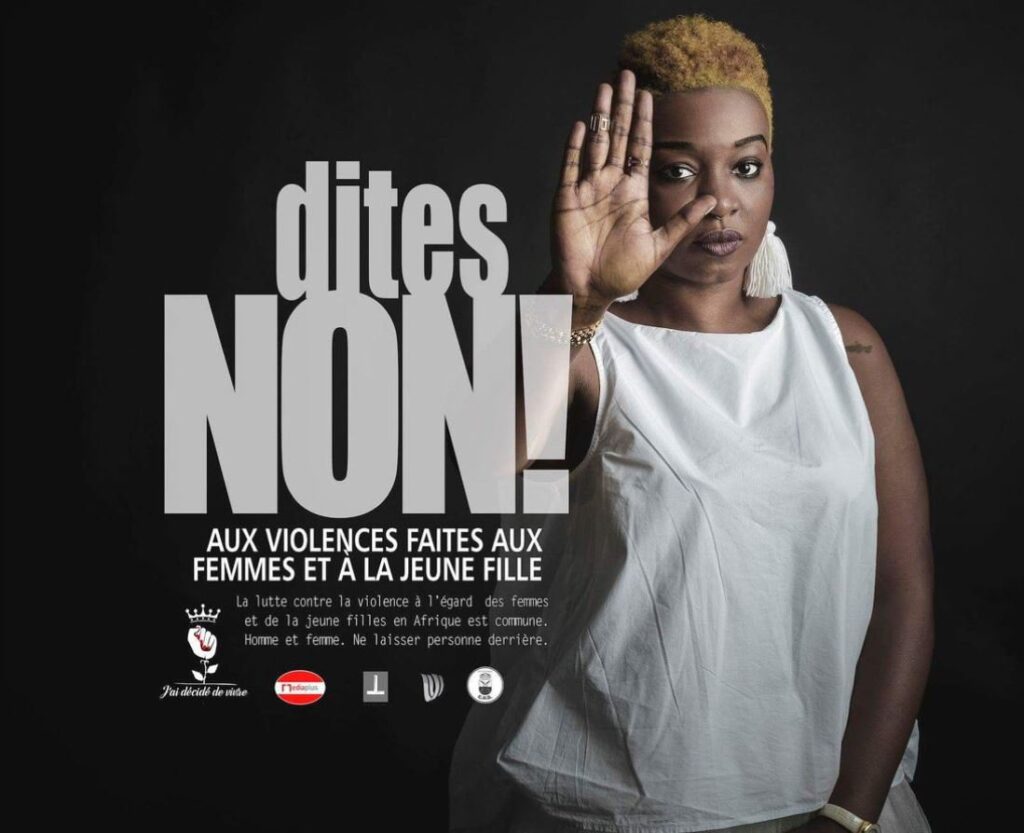In many cultures in West and Central Africa, a man who does not hit his wife is seen as a man who does not love her enough to show her ‘the right way’ to behave. At the same time, a woman who is not sexually harassed is often viewed as a woman ‘not beautiful enough’ to attract men. Furthermore, a woman who complains about domestic abuse is seen as a woman who disrespects her husband or intimate partner, washing her dirty linen in public; or a woman so frigid, and with a mind so narrow, that she cannot acknowledge ‘sexual appreciation’ of her.
The double standards and contradictions are boundless.
But this year’s 16 Days of Activism Against Gender-Based Violence campaign, which started on 25 November and ended on 10 December, has created a different tone. As was the case around the world, the #MeToo phenomenon reached timelines in the region and entered our lives a year ago in its French version #BalanceTonPorc (Denounce your Pig), and the French-Canadian one #MoiAussi (Me Too). This year’s international theme picked up on this momentum and was held under the broad banner of #HearMeToo.
#MeToo: A positive impact on the region
Before the #MeToo campaign, voices against gender-based violence were previously subjected to violent verbal attacks. But during this year’s 16 Days campaign, activists’ calls have become more audible and accepted by institutions, organisations and individuals. Cameroon-born activist Minou Chrystayl was one of those who suffered social media shaming before #MeToo. About a year before the revelations that led to the exposés of big Hollywood figures like Harvey Weinstein and Kevin Spacey, she posted pictures of her bruises on her Facebook account, saying she was tired of hiding behind makeup and covering for her then partner who physically and emotionally abused her. While some showed support for her, many were skeptical and argued that an abused woman would never expose herself in such a manner and accused her of acting for likes and shares. Despite the shaming, she went on with her fight for women to be able to speak up about domestic violence.
With #MeToo and #BalanceTonPorc, the landscape radically changed. Several women took to Facebook and Twitter to name and shame those who sexually assaulted and/or harassed them. Though it was refreshing to finally see women empowered enough to have public conversations over these issues, it was hurtful to realise that it was often family members – uncles, brothers, cousins and even fathers – who were the perpetrators.
Female bloggers renowned for addressing social issues such as NK Thiat from Senegal, Armelle Nyobe and Téclaire Ekedi Wilson from Cameroon, Chantal Naré from Burkina Faso and Edwige Mensah from Togo used their social media platforms to amplify the voices of these women who suffered in silence for years. Several platforms published contributions from women who finally had the opportunity to talk. Initially created for mothers and fathers to share their experiences as parents, the collaborative platform Les Maters enabled women to publicly share their stories of abuse.
The 16 Days of Activism campaign in Central and West Africa ran alongside others such as “Dites NON aux violences faites aux femmes et à la jeune fille” (Say NO to violence against women and young girls) launched earlier this year. For that campaign, Minou Chrystayl gathered public figures, artists and influencers across both Central and West Africa. The Senegalese campaign Doyna, also aligned with #HearMeToo, mobilised influencers – from writers and dancers to politicians – who committed to “breaking the culture of silence”.

Going beyond the internet
But despite people finally speaking up, conversations around sexual harassment, rape and domestic violence generally remain taboo, and campaigns rarely go beyond the internet with several women still opting for anonymity in coming out to share their stories. Gertrude Kemayong, from Cameroon, manages a Facebook page for women to speak up about violence. She shared that several women coming to her are still not ready to share their stories publicly, or even with other women going through similar ordeals. Many of these women do not dare like the page, fearing someone would know about them having an interest in such issues, and appeal – via private messages – for Kemayong to never mention their names because of the societal shame they would have to face. The platform Les Maters faces a similar situation: most of the articles about domestic violence, rape or sexual harassment are posted with pseudonyms or “Anonymous” as signature.
While the #MeToo campaign has been helpful, there is still a lot to be done in West and Central Africa. Though the majority of the countries in these regions signed and ratified the Protocol to the African Charter on Human and Peoples’ Rights on the Rights of Women in Africa – better known as the Maputo Protocol – that recognises and guarantees women’s rights, several governments are yet to adopt or even domesticate existing laws protecting women against gender-based discrimination and violence. For example, domestic violence is punishable by law in Cameroon, but it remains difficult for a woman to report domestic abuse: the police usually tell women it is a family matter that should be resolved with family members without any external intervention. In Senegal, though the law is very clear on the criminalisation of domestic violence, families often forbid women from reporting abuses, refusing to face the shame that goes with making the issue public.
Though voices have been heard, a big task still lies ahead: that of taking conversations from the internet to the streets, and from the streets to parliaments. But all hope is not lost. The first step to change is acknowledgement and for once, the issue has been widely acknowledged across the region.
(Main graphic: Centre for Women’s Global Leadership)
The opinions expressed in this article are those of the author(s) and do not necessarily reflect the views of SAIIA or CIGI.
